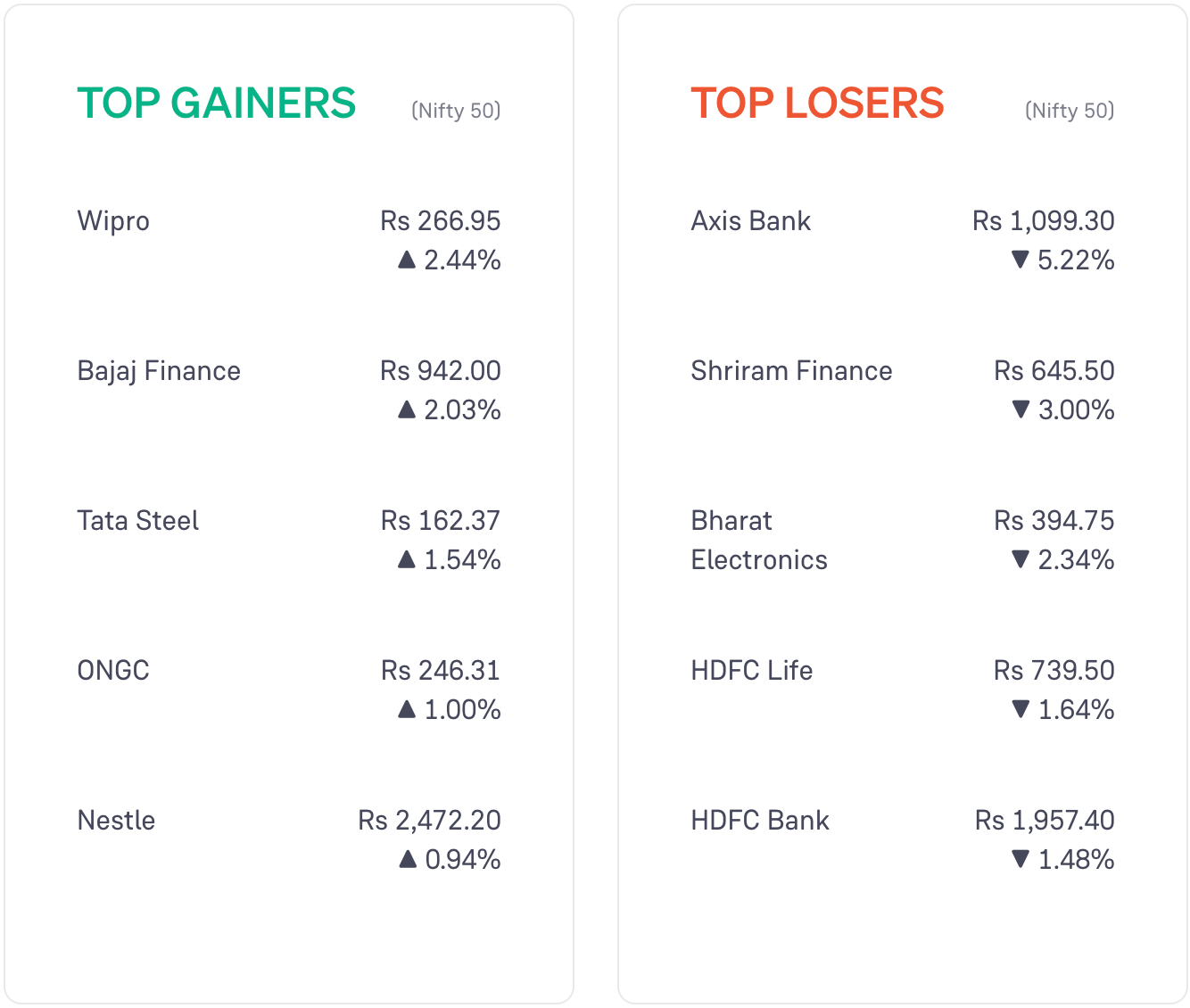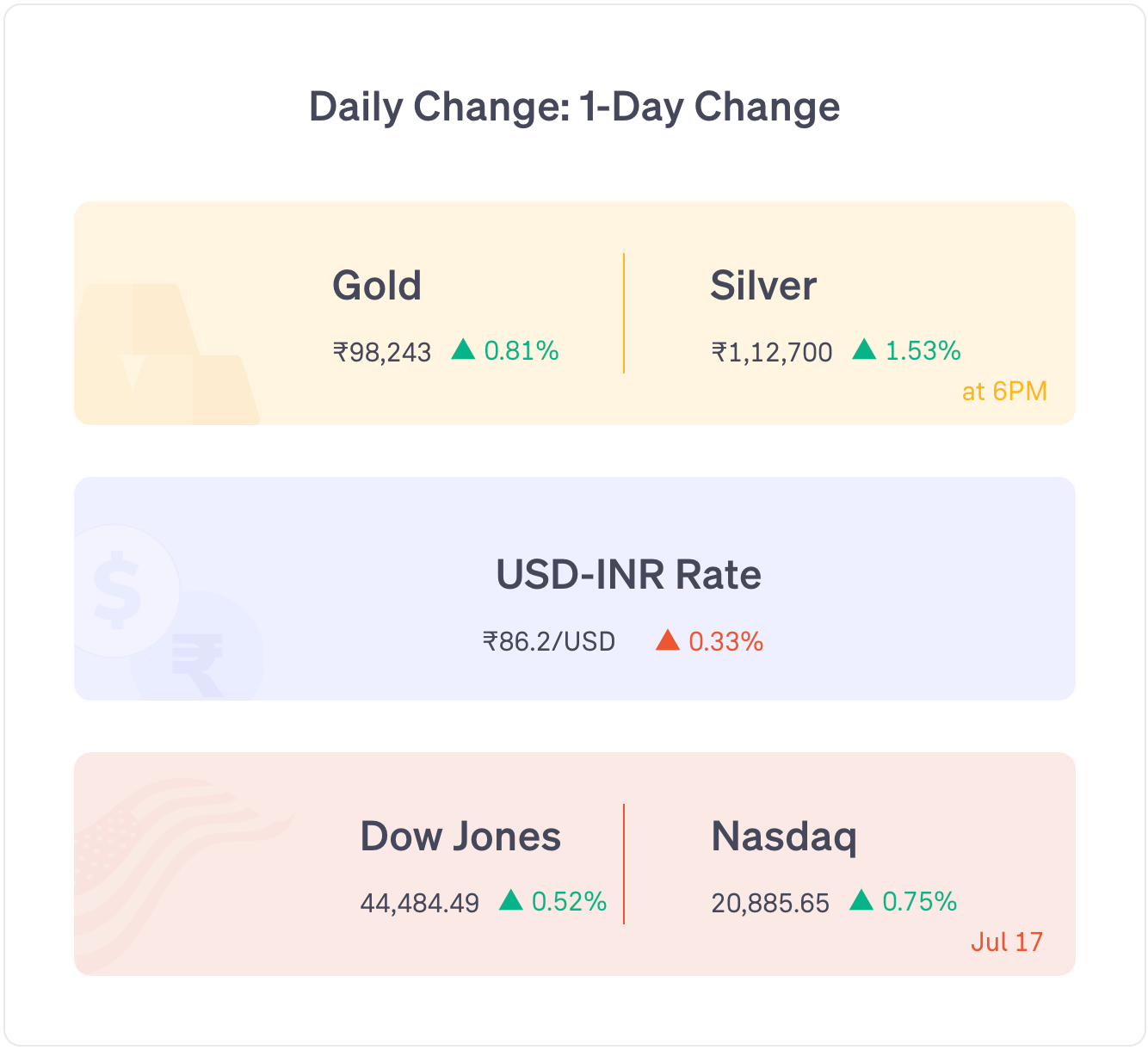Fall in foreign exchange reserves, Reliance Retail acquires Kelvinator, & more — Daily Digest
Friday, 18 July 2025
Markets opened slightly above yesterday’s closing point.
Nifty 50 fell sharply in the early hours and closed in red.
Media stocks and metal stocks rose the most today. Private bank stocks and consumer durables stocks fell the most.
Global markets: US and most European markets closed in green. Most Asian markets also rose.
News
Japan’s inflation rate fell to 3.5% year-on-year in June (vs 3.7% in May). Core inflation also fell to 3.3% (vs 3.7% in May).
The European Union imposed sanctions on a Russian owned oil refinery in India and lowered the oil price cap. This move aims to limit Russia’s war funding.
India’s foreign exchange reserves fell by $3.06 billion to $696.67 billion in the week that ended on 11 July.
India’s first indigenously designed and constructed diving support vessel, INS Nistar, was inducted in the Indian Navy. The vessel is designed for deep sea diving and rescue operations.
Stocks Updates
Reliance: company subsidiary, Reliance Retail, acquired the home appliances brand Kelvinator.
JSW Steel: net profit rose 158.5% year-on-year to Rs 2,184 crore in the April-June quarter. The company will acquire up to 100% of Saffron Resources. It may also increase stake in JV firm JSW Severfield by 24.9% for Rs 235 crore, and will form a JV with Andhra Pradesh Mineral Development Corp to develop an iron ore project worth Rs 1,075 crore.
Hindustan Zinc: net profit fell 4.7% year-on-year to Rs 2,234 crore in the April-June quarter.
Tata Power: company subsidiary, Tata Power Renewable, signed a 120 MWh battery energy storage purchase agreement (BESPA) with NHPC to set up a project in Kerala.
Info Edge: agreed to transfer its entire 26.14% stake in Shopkirana to Udaan’s arm HEPL in exchange for a 0.91% stake in HEPL. Udaan is a B2B e‑commerce platform.
Tata Motors: incorporated a not-for-profit subsidiary, Tata Motors Foundation, to carry out CSR activities.
Bajaj Auto: company subsidiary, Bajaj Auto Credit, approved issuance limits of Rs 5,000 crore in NCDs, Rs 3,000 crore in commercial papers, and Rs 750 crore in subordinated debt.
Infosys: company’s UK-based subsidiary will set up a new wholly owned subsidiary called Infosys BPM Canada in Canada.
Lupin: company’s Pithampur Units 2 and 3 were inspected by the US FDA which marked 4 and 3 observations respectively.
Ambuja Cements: received a ‘no objection’ letter from NSE for its merger with Sanghi Industries.
Sun Pharma: incorporated a new wholly-owned subsidiary, Sun Pharma (Hainan) Company Limited, in China to localize product manufacturing and sales.
Word of the Day
Float
It is the number of shares of a company that are available for trading in the stock markets
They are the shares that are publicly available, circulating in the stock markets — but not the total shares of the company.
Shares held by the promoters, major investors or the government are not included in the company’s float.
A company’s float might affect the stock price.
If the float is low, meaning fewer shares are available for trading, the stock price can be volatile. Shifts in the demand can lead to price swings.
Similarly, if the float is high, the stock price would usually be comparatively more stable.
6 Day Course
Theme: understanding MF returns
Day 5: Friday
Another thing to understand is that mutual fund returns are always measured comparing 2 points in time.
1 year returns: returns comparing today and 1 year ago.
3 year returns: returns per annum comparing today and 3 years ago.
Mutual fund returns tend to be varied, and not consistent. This means that returns can be different for different periods.
So, it is possible that you see a mutual fund give 3-year returns of 15% p.a. but your actual returns are 9% p.a. (example).
This is because the starting and ending measuring points are different.
In case of good mutual funds, this usually does not matter in the long run as the returns catch up.
The problem comes when a mutual fund has given abnormally high returns (because of luck or other temporary reasons).
Example: some mutual funds were showing 3 year returns higher than 30% p.a.
Many investors invested at this point. This kind of a return may be a temporary rise. Investors who start investing at this point will likely not get such returns.
Featured Question
Q. “Please explain short term capital gain tax and long term”
Stocks investments are taxed differently for different periods of investment.
Short term: if you buy shares and sell them in less than 1 year.
The profits or gains in this case are called short term gains.
They are taxed at 20% of the gains.
This is called STCG tax or Short Term Capital Gains tax.
Long term: if you buy shares and sell them after 1 year of buying.
The profits or gains in this case are called long term gains.
They are taxed at 12.5% of the gains. The first Rs 1.25 lakh gains are exempt from taxation in this case.
So, 12.5% tax is charged on the gains made above Rs 1.25 lakh.
This is called LTCG tax or Long Term Capital Gains tax.
Do note, the tax is applicable only on the gains or profit, not the entire invested amount.
If there are no profits or there are losses, no taxes are payable.
Equity mutual funds and stocks investments are taxed in the same manner.
The above STCG and LTCG rates are for equity investments only. The tax rate and durations are different for different assets like gold, real estate etc.
Did you like this edition?
Leave a feedback here!






